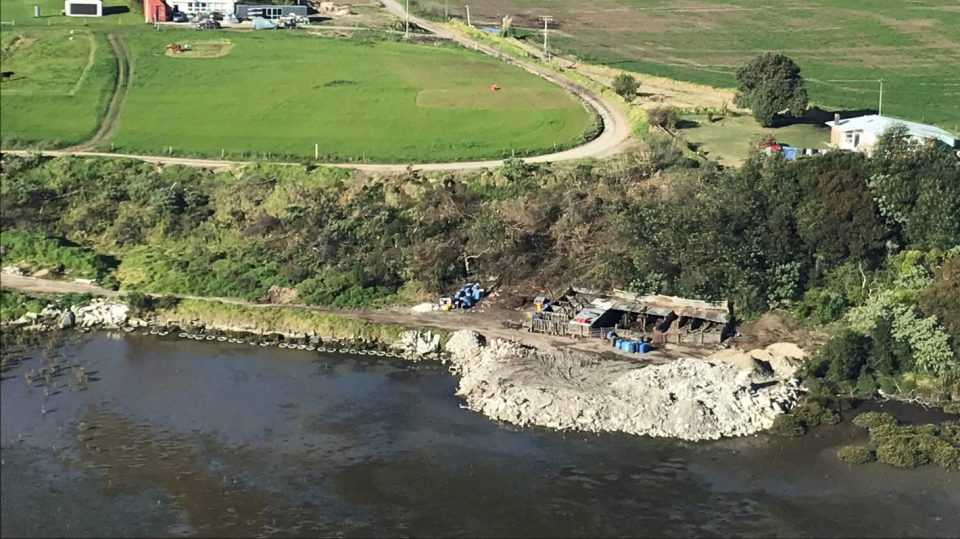SUPPLIED
Tio Faulkner tried to illegally expand his property into Tauranga Harbour using demolition waste, which will cost just under $100,000 to clean up.
Ratepayers may be left picking up a $330,000 tab for cleaning up, and legal costs, after Tio Faulkner dumped demolition waste into Tauranga Harbour in an attempt to create a “park” for his family.
Faulkner was sentenced to three months and two weeks’ imprisonment last Thursday at Tauranga District Court after earlier being found guilty of six charges under the Resource Management Act.
His illegal expansion into Tauranga Harbour was spotted in a 2019 aerial survey by Bay of Plenty Regional Council, and follow-ups revealed a piggery releasing effluent into the water.
He used broken concrete to build what amounted to a three-metre high platform, about 30 metres wide and stretching 15 metres into tidal flats.
READ MORE:
* Pig farmer who created demolition waste ‘park’ in Tauranga Harbour jailed
* Tauranga pig farmer facing jail time over illegal harbour earthworks for makeshift ‘park’
* Man was reclaiming part of Tauranga Harbour coast to make a ‘park’ for his family
In total, it covered some 1000sqm.
Bay of Plenty Regional Council compliance manager Alex Miller said legal costs so far for council had amounted to approximately $240,000, plus GST.
“The harbour waste clean up is expected to cost at least $92,905, plus GST,” he said.
“Regional Council is exploring all available legal options to avoid the ratepayers bearing the costs of cleaning up the harbour.”
Benn Bathgate/Stuff
Tio Faulkner defended himself against the charges, and is set to appeal to the High Court against his conviction.
In total, the bill stands at $332,905 at present.
At Faulkner’s sentencing last week however, prosecutor Ben Hopkinson seemed to suggest ratepayers would be left picking up the bill.
“It certainly isn’t going to be Mr Faulkner because he doesn’t have any money.”
Miller said that the environment and community were top priorities for council, “and situations which require enforcement action, and consequently incur costs, reinforce the importance of everyone doing their part in looking after our natural and physical resources”.
“We also note this case appears to be only the sixth time that a defendant in a Resource Management Act prosecution has been sentenced to imprisonment.”
Miller said he was unable to comment on Faulkner’s sentencing, “as the defendant has appealed the case to the High Court”.
SUPPLIED
A view of Tio Faulkner’s mound of rubble, part of a plan to ‘create something similar to Memorial Park for his whānau to use’.
At earlier court hearings it emerged when he was told by council staff he needed resource consents for depositing the material on the foreshore, and for operating the piggery, he told them he held an “intellectual resource consent” issued by the “Tangatawhenua Wealth and Resource Management Authority” that allowed him to undertake any work he wanted to on the property.
In the following months Faulkner used more material, including steel, polystyrene, plastic and wood to extend the reclamation, which is inside an area recognised as an ‘’Area of Significant Cultural Value’’.
The council issued him an abatement notice in September 2019, and another in November 2019, but he did not comply.
The court heard evidence from staff who were told by Faulkner that he wanted to “create something similar to Memorial Park for his whānau to use”.
It also heard that he accused the staff of trespassing and told them his “Intellectual Resource Consent” allowed for “earthworks mitigation for effects of global warming”.
When she began her sentencing last week, Judge Prudence Steven described Faulkner’s submissions as numerous, lengthy and “bordering on being unintelligible”.
His offending was “sustained and unrepentant”, she said.


